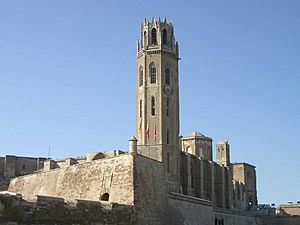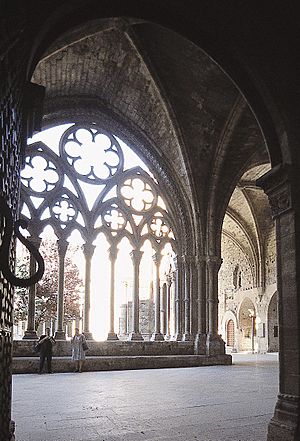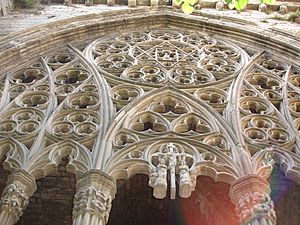Old Cathedral of Lleida facts for kids
The Cathedral of St. Mary of la Seu Vella is an amazing old church in Lleida, Catalonia, Spain. It sits high up on a hill, so you can see it from almost anywhere in the city! This beautiful building used to be the main church for the area.
In 1707, something big happened. King Philip V of Spain decided to turn this grand Gothic church into a military fort. Because of this, a new church, called the Seu Nova (which means "New See"), was built downhill. It was officially opened in 1781. Even though there's a new church, the Seu Vella is still the most important symbol of Lleida.
Contents
History of the Seu Vella
From Ancient Times to a Mosque
The spot where the Seu Vella stands has a long history. Long ago, there was a very old Christian church there. Later, after the Muslims came to Spain, this church was rebuilt in 832 and used as a mosque.
Becoming a Christian Church Again
In 1149, Christian leaders Ramon Berenguer IV of Barcelona and Ermengol VI of Urgell took back the city of Lleida. The building was then made into a Christian church again, called "Santa Maria Antiqua." It was looked after by a group of priests.
Building the New Cathedral
In 1193, the church leaders decided to build a brand new, bigger church. They wanted it to be in the popular Romanesque style of the time. A master builder named Pere de Coma was in charge. The first stone was laid in 1203 by King Peter II of Aragon and Count Ermengol VII of Urgell.
The building work continued for many years, even during the time of King James I of Aragon. The church was finally dedicated to the Virgin Mary on October 31, 1278. The beautiful cloisters, which are like open courtyards, weren't finished until the 1300s. The tall bell tower was started in the 1300s and completed in 1431. The main entrance, called Porta dels Apòstols, was also built between the 1300s and 1400s.
From Church to Military Fort
In 1707, the city of Lleida was taken over by the troops of Philip V of Spain. The king was very angry because the cathedral had been used to help defend the city. He ordered the church to be destroyed! Luckily, his order was never carried out. Instead, the cathedral was turned into army barracks, a place for soldiers to live.
Restoration and National Monument
For many years, the Seu Vella was used by the military. But in 1918, it was declared a national monument, which means it's a very important historical building. Restoration work, to fix and preserve it, began in 1950. Today, it's a wonderful place to visit and learn about history.
What the Seu Vella Looks Like
Architectural Style
The Seu Vella is built in a special style that mixes Romanesque and Gothic designs. It doesn't have much influence from Islamic architecture, which is interesting given its history. The church is shaped like a Latin cross when you look at it from above. It has a main area called a nave and two side areas called aisles. The central part of the church has five rounded sections called apses.
Inside, the church used to be covered in painted murals and sculptures. Many of these beautiful artworks are still there, but some were damaged or taken during the War of Spanish Succession.
The Bell Tower
The bell tower is shaped like an octagon. It's about 12.65 meters wide at the bottom and gets a bit narrower at the top, about 9.62 meters wide. This impressive tower stands about 60 meters tall and has 238 steps inside! It has two famous bells: Mònica, which rings every 15 minutes, and Silvestra, which rings every hour. These bells are from the 1400s and have a special international Gothic style.
The Amazing Cloister
One of the most unique parts of the Seu Vella is its cloister. Usually, cloisters are behind the main church, but here, it's right in front of the main entrance! It's also famous for being incredibly large, one of the biggest cloisters in Europe. From its open walkways, you can see amazing views of the city.
The cloister has 17 beautiful Gothic windows, and each one is different. One special window is called "the palmtrees" and shows a Muslim design. Another important window in the western part has a complex design that includes both a King David's Star and a Christian cross.
See also
 In Spanish: Seo Vieja (Lérida) para niños
In Spanish: Seo Vieja (Lérida) para niños
 | Leon Lynch |
 | Milton P. Webster |
 | Ferdinand Smith |





